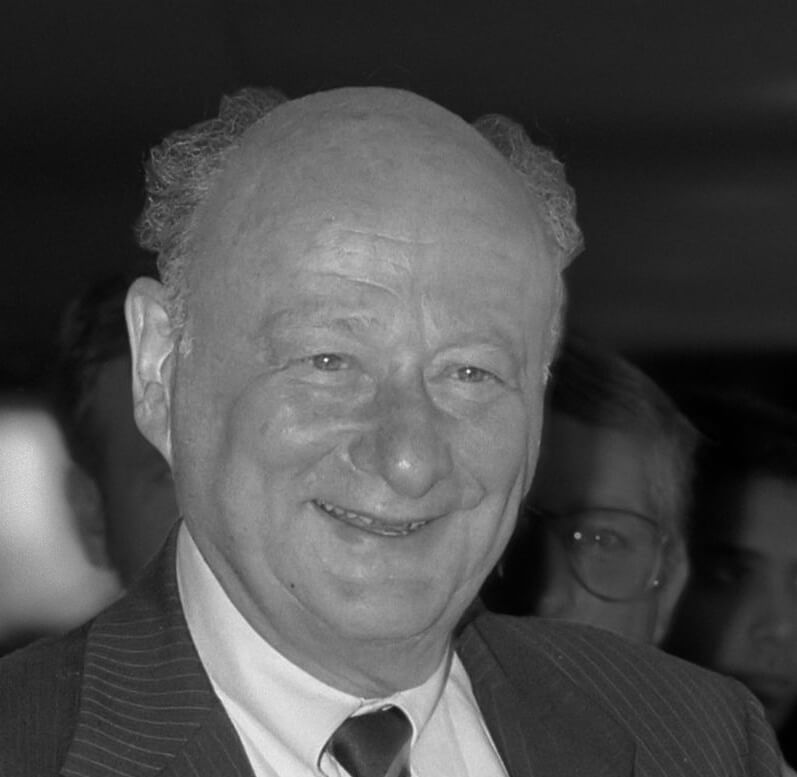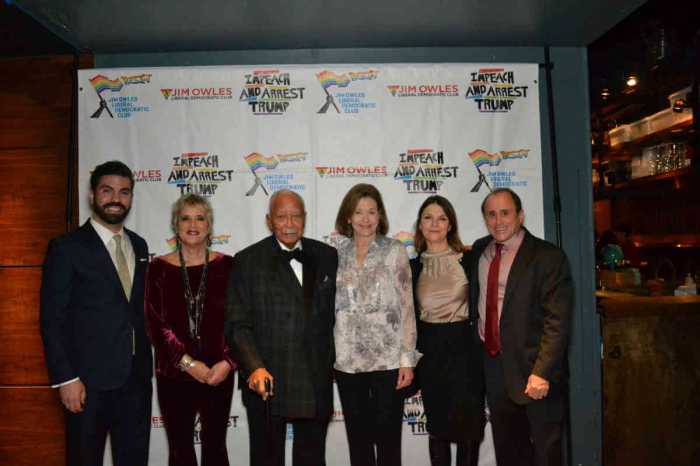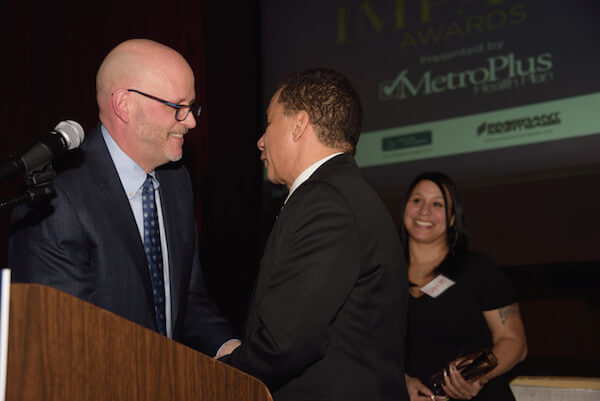The New York Times never covered Ed Koch’s closeted homosexuality and how it warped his governance while he was Mayor of New York (1978-89), nor in his post-mayoralty when he drifted further right and endorsed anti-LGBTQ Republicans, nor in his 2013 obituary — which did not even delve into his neglect of the AIDS crisis until the AIDS community chastised them. But on May 7, they acted as if they were breaking new ground in a front-page article, “The Secrets Ed Koch Carried,” billed by Carolyn Ryan, the out lesbian deputy managing editor, as a story that “has never been fully told” — a grossly negligent claim given the in-depth coverage of Koch’s closet for decades in the LGBTQ press and other outlets.
The story featured and was apparently pushed by friends of Koch. Notably quoted was Koch apologist Charles Kaiser who, despite being a journalist, was among those who covered up for his friend for years. It came — as the story points out — amidst a growing campaign to remove Koch’s name from the Queensboro Bridge primarily over his racial divisiveness and his neglect of AIDS.
The Jim Owles Liberal Democratic Club — led by veteran gay activist Allen Roskoff — spearheaded the bridge renaming campaign by asking political candidates, “In view of the fact that Ed Koch has been documented to have caused the deaths of hundreds of thousands of people with AIDS and was blatantly racist, would you support and sponsor a bill to rename the former Queensboro Bridge?”According to the club, the initiative has been endorsed by Mayor Eric Adams; State Attorney General Tish James; State Comptroller Tom DiNapoli; Public Advocate Jumaane Williams; Borough Presidents Donovan Richards (Queens), Mark Levine (Manhattan), and Vanessa Gibson (Bronx); Congressmembers Jerrold Nadler, Carolyn Maloney, Alexandria Ocasio-Cortez, Adriano Espaillat, Jamaal Bowman, and Ritchie Torres; Brooklyn District Attorney Eric Gonzalez; lieutenant governor candidate Ana Maria Archila; and a host of state legislators and city lawmakers.
The Times story frames Koch as a lonely guy who just wanted to be loved. It does talk about the lover he had at the time of his election as mayor, Dick Nathan, who Koch shut out and let it be known through staff that he should get out of town if he wanted a career — a story that has been in published reports and documentaries for many years.
The story also talks about Koch’s gay friends trying to set him up with guys. Kenneth Sherrill, emeritus political science professor at Hunter, was the first out gay person elected to a Democratic district leader post in New York in 1977 — the same year that Koch won the mayoralty.
“Koch never thought of himself as a gay man,” Sherrill said.
Indeed, the story has Koch telling mayoral staff, “I am not a homosexual,” going even further than the execrable Roy Cohn when he was confronted by me about his homosexuality on a TV show: “I am not a member of Mr. Humm’s club,” Cohn said.
That lack of solidarity with others who shared his sexuality led Koch to evolve from championing gay rights as a Greenwich Village assemblymember and congressmember to siding against the LGBTQ community repeatedly once mayor — and criminally neglecting the AIDS crisis. Yes, he came through with a promised executive order on day one in 1978 protecting city employees from discrimination based on sexual orientation, but reneged on a promise to get the city gay rights bill passed within six months. It took nine more years, as Koch made excuses for councilmembers who opposed it rather than twisting their arms like he did with controversial legislation that was important to him. And Koch’s close alliance and friendship with Cardinal John O’Connor, the leading opponent of gay rights in the city — which is touched on in the Times’ story — was indicative of how little his sexual identity mattered to him. Koch went on to endorse George W. Bush for re-election in 2004, the year Bush ran on support for a constitutional amendment against same-sex marriage. Koch’s enthusiasm for Bush’s catastrophic Iraq War overrode any concern for the president’s bigotry.
In later years, Koch said he was “delighted” when the feminist and performance group Pussy Riot was given two-year sentences in 2012 for protesting Putin’s anti-LGBTQ crackdown in a cathedral.
Sherrill, who worked to help elect Koch in ’77, recalls Koch’s immediate shift to the right as mayor and how he himself became persona non grata at City Hall for continuing to push progressive issues that Koch abandoned.
Arthur Schwartz, the surviving partner of Koch’s gay liaison, Herb Rickman — a man so hostile to the gay movement he referred to activists as “show fags” — tells the Times that Rickman would set up a guy for Koch to meet at Rickman’s apartment and then leave for Schwartz’s. Unmentioned is that Rickman, in at least one case, was not asking men if they would like to date the mayor but allegedly brought over an unsuspecting young Koch administration lawyer, Dennis de Leon, so that Koch — his boss — could grope without his consent. De Leon then fled. (See my obit on Koch in 2013 in Gay City News that documented this and much of what the Times purports to be new.)
According to Roskoff — a Koch antagonist who said he was interviewed for the story by Matt Flegenheimer but not quoted — the New York Times had read our story but omitted this damning report that was told to me and others by de Leon personally the year he died of AIDS. When I interviewed Koch himself about de Leon’s account, he said with shocking glee, “He’s dead!”
De Leon, an out gay man, became head of the City Commission on Human Rights under Mayor David Dinkins in 1990 when I was one of the 15 commissioners.
The story also says Koch’s campaign manager, David Garth, threatened to dump him if Koch was “a fag.” The story says veteran gay political operative Ethan Geto told Garth, “He says he’s not gay. I take his word,” though he admits he knew Koch was homosexual for many years. But during the campaign, Garth told Jack Newfield of The Village Voice that Koch and Bess Myerson, with whom he campaigned for cover, were “the Smith Brothers,” i.e, “beards” for each other. And Christopher Lynn, a gay activist and Koch loyalist who worked in the campaign, told me, “Garth knew Ed was gay. Everybody knew it.”
The Times is the newspaper that itself ignored the AIDS crisis at its outset in 1981 (save one short piece citing a CDC report in 1981), letting it spread out of control. The executive editor then was Abe Rosenthal, who rooted out gay employees, suppressed coverage of gay issues, and wouldn’t even allow the use of the word “gay” in its pages (other than in the name of a group). To the Times, an out gay or lesbian person was “an avowed homosexual” — or, in the 1950s, simply someone engaged in “sexual perversion.”
AIDS activist and playwright Larry Kramer always blamed the willful inaction of Koch, President Ronald Reagan, and the New York Times at the onset of AIDS for contributing mightily to letting HIV turn into a worldwide pandemic that has now killed 35 million people and infected 35 million more.
The Times didn’t get a scoop here. Koch’s closet was featured in Larry Kramer’s 1985 play “The Normal Heart,” Tony Kushner’s “Angels in America” (1991), Kirby Dick’s documentary “Outrage” (informed by the work of Mike Rogers), and was well-documented in LGBTQ press obits on him in 2013 and in countless stories in years past.
Ann Northrop, my co-host on the Gay USA national cable show, dismissed the Times article on Koch as a lamentable example of “the self-perpetuating hierarchy”—people in power covering for each other instead of telling the truth. “And the New York Times collaborated for decades by willfully ignoring the obvious.”
Barbara Raab, a longtime journalist and early member of the National Lesbian and Gay Journalists Association (now known as NLGJA: The Association of LGBTQ Journalists), said, “I wish Carolyn Ryan’s tweets about ‘why we wrote the story’ actually explained ‘why we didn’t write the story until now,’ or ‘why we didn’t write this story when the closeted mayor of NYC was turning a blind eye to the fact that his own city was the epicenter of a public health crisis that was killing tens of thousands of other gay men.’ Surely, many reporters working their sources at that time could have confirmed, even if anonymously (a practice which the NYT uses on a daily basis), that Ed Koch was gay and was behaving destructively and hypocritically. Sounds like a story to me.”
Koch’s gay friends want to create a more sympathetic narrative about a man widely reviled by LGBTQ people, people of color, and other marginalized people.
The “Comments” section of the Times article is telling. Many people wrote to say, “We always knew he was gay and we didn’t care. He was a great mayor.” But what they “knew” was that Koch was a closet case and they liked that about him. In fact, many would be happy if all LGBTQ people were closeted and it is clear that today’s Republican Party is working assiduously to shove LGBTQ people out of school curricula, libraries, health care, marriage, adoption services, and more. That can only succeed if they can make us feel shame and fear.
Koch’s tombstone reads, in part, “He was fiercely proud of his Jewish faith. He fiercely defended the City of New York, and he fiercely loved its people.” But his shame and fear over his homosexual identity informed his public life to the detriment of LGBTQ people and the city itself.
LGBTQ journalists and leaders signed an open letter responding to the article in the New York Times. See the letter here.



































